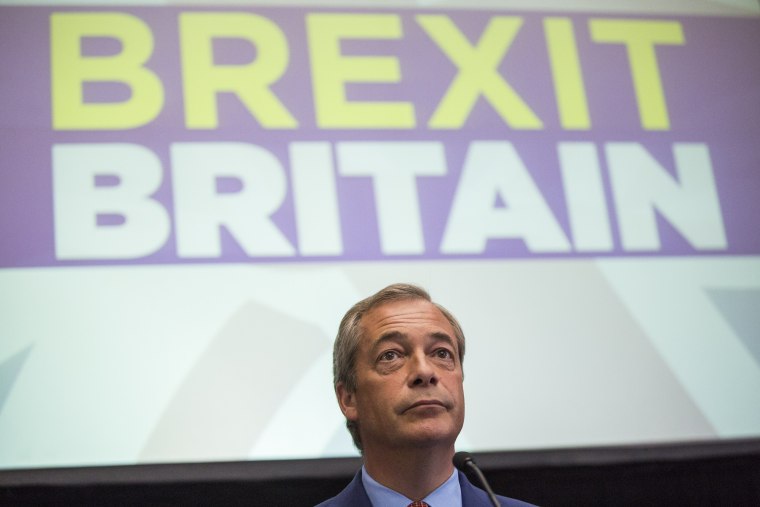LONDON — One of the leading voices of the campaign for Britain to leave the European Union resigned as leader of his party Monday, saying "I have done my bit" toward Brexit.
Nigel Farage, the populist leader of the right-wing United Kingdom Independence Party — known as UKIP — said his party was in "a pretty good place" following its role in the successful cross-party "Leave" vote.
UKIP's core purpose is for Britain to leave the EU, and Farage said the referendum result "means that my political ambition has been achieved."

He added, however, that the victory did not render the party redundant.
"Whilst we will now leave the European Union, the terms of our withdrawal are unclear," he told reporters in London. "If there is too much backsliding by the government, and with the [center-left opposition] Labour party detached from many of its voters, then UKIP's best days may be yet to come."
Related: Could Brexit Give U.K. Its 2nd Female Prime Minister?
Farage led the pro-Brexit charge alongside Conservative lawmaker Boris Johnson. The New York-born former London mayor was considered the front-runner to be the U.K.'s next prime minister until his closest ally, Justice Secretary Michael Gove, announced the shock decision to run against him on Thursday.
Farage's campaign for Brexit leaned heavily on immigration, suggesting to voters that leaving the EU would give Britain more control over its borders.
Although this claim has since been questioned — many analysts say the U.K. would need to keep its borders open to access the EU's free market — the message resonated with large sections of the electorate, particularly older, working class voters.
During the campaign, Farage was criticized for a poster featuring a line of migrants and refugees crossing the Croatia-Slovenia border in 2015 alongside the text "BREAKING POINT."
Some commentators on social media pointed out the image's inadvertent similarities to Nazi propaganda from the 1930s.
Along with the post-Brexit resignation of British Prime Minister David Cameron, Farage's announcement means three of the U.K.'s mainstream parties — the ruling Conservatives, UKIP and the smaller Green Party — are now facing leadership elections.
Added to this uncertainty, most lawmakers in the opposition Labour party are in open revolt against their far-left leader, Jeremy Corbyn.
UKIP became the country’s third-largest party by votes at last year’s general election. However, because of Britain’s electoral system, their 12.6 percent vote-share gave them only one lawmaker, Douglas Carswell, who defected from the Conservatives in 2014.
Farage has stood and lost in seven Westminster elections. However, he has been a lawmaker at the European Parliament since 1999.
